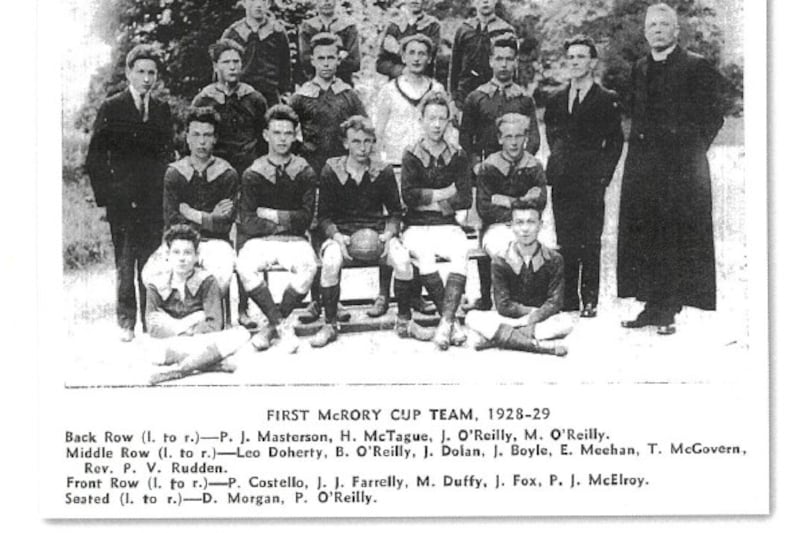OMAGH CBS have been banging on the door for the past few seasons, but just haven’t been able to deliver the final blow to knock it down.
Since the last of the school’s four MacRory Cup triumphs in 2007, false dawns and stories of pure bad luck have punctuated successive campaigns.
Three finals have been lost in those intervening years, with St Patrick’s, Maghera, St Colman’s, Newry and Tyrone rivals St Patrick’s, Dungannon all coming out on top on St Patrick’s Day.
There was further agony earlier this year when Maghera were on the ropes in a quarter-final but the CBS lads were unable to finish the job off.
The regrets merely intensified when the prolific south Derry college went on to win yet another title.
“We have been competitive but we just haven’t managed to get over the line,” said coach Kieran Donnelly
“It’s tough every year. Most teams now are competitive, they’re training well. It’s quite an intense competition and every team’s preparation is quite professional, with no stone left unturned.
“We have been knocking on the door this past number of years, we got beaten in a final two years ago by Maghera, who were exceptional team that day, and we weren’t expected to get to the final.
“We were beaten unluckily in a final against Dungannon in Omagh, when we played very well and lost out in 2009, and we lost the final to St Colman’s the following year, when we had a really good team as well.”
As ever, a fresh challenge has been confronted with fervour on the Kelvin Road, and there’s every reason to think that a talented squad will be front-runners for the 2016/17 title.
A decent smattering of county minors are among those who return from last year’s panel, including Peter Logue, Eoin Donnelly, Benny Gallen, James McGurk, Oisin Donnelly and CBS skipper Peter Og McCartan of Errigal Ciaran.
Another Tyrone minor, Cahir Goodwin, joins the set-up, while immense potential comes from the likes of Ryan McCusker, Tiarnan Murray, Aidan Donaghy and Eoghan Keenan.
“Nowadays most players come with that bit of experience, because they’re involved in development squads, and a few of them making the county minor team as well,” said Donnelly.
The promise of the current group was flagged up some years ago as their individual skills and a capacity for unity and teamwork developed, and found expression in a successful Brock Cup campaign.
“They have been a good squad. They had a good year with the Brock, and they have that bit of pedigree,” said Donnelly.
“That’s the benefit with school teams, that they have grown up together, and they have played together, so they gel together quite well because they know each other so well.
“They’re a good squad.
“These boys would see themselves as a hard-working team, there would be no stand-out names, they’re all very good, intelligent players, they have worked very hard for each other, and they have good skill levels as well.”
Donnelly, who is assisted by Fearghal Quinn, Des Maginness and Cathal McKenna, expects his team to entertain, and to prosper in its mentality of positivity.
While accepting that the colleges game has suffered from the defensive mind-set that has filtered down from the highest levels of inter-county football, he is convinced it has survived with minimal contamination.
“I think it’s still one of the best forms of football, because it’s more open than the county game, and you try to encourage young players to go out and express themselves,” he said.
“It’s still a very high quality of football and it is one of the most enjoyable games to watch.
“There is that off-the-cuff instinct. They’re more expressive at a young age.
“You still try to create that culture, and not take that away from a young fellow, and try to let them express themselves.”
“But you are probably more aware of the opposition now, and how you counteract that and devise methods to nullify teams.
“With that comes teams trying to sit back and mark space and not be easily exposed. You have good quality coaches involved in all the schools, and none of them are naïve, so I suppose that day of going
man-to-man is possibly gone, even at colleges level.
“I do think it has moved on, like the county scene, but that’s only moving with the times, and I think it’s understandable that the modern coach or manager will look at the opposition and try to nullify them, and with that comes that filtering back and marking space.”
Omagh’s mission to qualify for the knock-out stages won’t be taken as straightforward.
A group containing St Patrick’s, Cavan, St Colman’s, St Mary’s Magherafelt and Patrician High presents varied challenges which will have to be dealt with by way of specific approaches.
“There’s five or six teams this past number of years that have been knocking on the door, and this group especially, with the likes of St Colman’s, who have been doing well up through the school with this group, and Cavan, who have re-ignited as well and are putting a lot of work in.
“So you do have to hit the ground running, and we’re aware of that, because it’s important to make the knock-out stages.”







